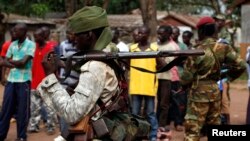The African Union (AU) plans to increase from 3,500 to 5,000 African-led troops to help end the escalating sectarian violence in the Central African Republic (CAR), says Erastus Mwencha, deputy chairman of the AU.
At a recent meeting, the United Nations Security Council proposed an African-led force of 3,500 to help contain or end the wave of violence in the CAR.
But, after expressing concern about the conflict, African heads of state agreed at a summit in France to increase the troop levels to contain the deteriorating security situation.
Mwencha said the AU’s Peace and Security Commission also reviewed the situation and backed the troop surge.
“The authorization which was given by the UN Security Council is around 3,500, but given the recent decisions and because of this surge in sectarian conflict, one is looking at 5,000 plus,” said Mwencha. “And so this is the challenge we are trying to deal with because with increased numbers... you need the capacity to airlift them, and give them logistical supplied to be able to carry out the mission as envisaged.”
Mwencha said that the AU’s international partners including the European Union and the United States have pledged financial support to the African-led troops.
“A number of countries have come forward to give support; some it materially, some of it finance. The European Union has pledged to give some funding to the level of $50 million, and the U.S. and others,” said Mwencha. “We do have some seed capital. We can start with in terms of mounting the operation …it is a crisis precisely for the fact that you don’t plan for it, [and] you don’t budget for it.”
Critics say African leaders, the AU and regional groups, including the Economic Community of Central African States (ECCAS) have again failed to implement measures to address the wave of violence in the CAR following the overthrow of President Francois Bozize last March. Mwencha disagreed with the criticism.
“[Since] March, [the AU has] been very active in first of all suspending the Central African Republic [from the group], setting up a process to bring them back to constitutionality, and also making arrangements for transition to elections,” said Mwencha. “You could never be able to predict the undercurrents that led to this surge of conflict...like anything else this is a situation that just got out of hand.”
Mwencha hailed France’s decision to send about 1,000 troops to boost its military presence in its former colony to help end the escalating security situation.
Michel Djotodia, the current leader of the CAR, led the Seleka rebel group that ousted Francois Bozize in March. Djotodia has since said he is not able to control all of the elements of the rebel group, some of whom are accused of playing key roles in the ongoing violence in the country.
At a recent meeting, the United Nations Security Council proposed an African-led force of 3,500 to help contain or end the wave of violence in the CAR.
But, after expressing concern about the conflict, African heads of state agreed at a summit in France to increase the troop levels to contain the deteriorating security situation.
Mwencha said the AU’s Peace and Security Commission also reviewed the situation and backed the troop surge.
“The authorization which was given by the UN Security Council is around 3,500, but given the recent decisions and because of this surge in sectarian conflict, one is looking at 5,000 plus,” said Mwencha. “And so this is the challenge we are trying to deal with because with increased numbers... you need the capacity to airlift them, and give them logistical supplied to be able to carry out the mission as envisaged.”
Mwencha said that the AU’s international partners including the European Union and the United States have pledged financial support to the African-led troops.
“A number of countries have come forward to give support; some it materially, some of it finance. The European Union has pledged to give some funding to the level of $50 million, and the U.S. and others,” said Mwencha. “We do have some seed capital. We can start with in terms of mounting the operation …it is a crisis precisely for the fact that you don’t plan for it, [and] you don’t budget for it.”
Critics say African leaders, the AU and regional groups, including the Economic Community of Central African States (ECCAS) have again failed to implement measures to address the wave of violence in the CAR following the overthrow of President Francois Bozize last March. Mwencha disagreed with the criticism.
“[Since] March, [the AU has] been very active in first of all suspending the Central African Republic [from the group], setting up a process to bring them back to constitutionality, and also making arrangements for transition to elections,” said Mwencha. “You could never be able to predict the undercurrents that led to this surge of conflict...like anything else this is a situation that just got out of hand.”
Mwencha hailed France’s decision to send about 1,000 troops to boost its military presence in its former colony to help end the escalating security situation.
Michel Djotodia, the current leader of the CAR, led the Seleka rebel group that ousted Francois Bozize in March. Djotodia has since said he is not able to control all of the elements of the rebel group, some of whom are accused of playing key roles in the ongoing violence in the country.





